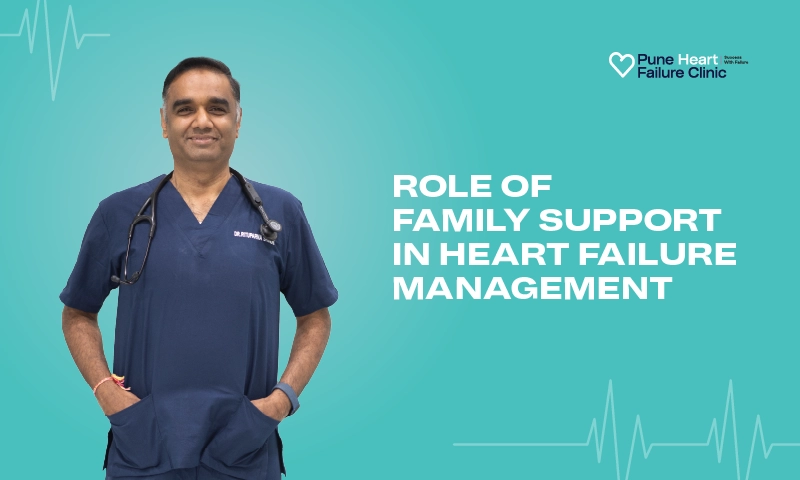When someone is diagnosed with heart failure, it changes the lives of everyone around them, not just the person who has it. The path requires more than just taking medicine and keeping an eye on symptoms; it also requires emotional strength, practical changes, and constant support. As a cardiologist, I’ve observed that patients who have their family around them all the time do much better than those who had to deal with the sickness on their own. Family engagement can mean the difference between a life confined by sickness and a life lived with hope, dignity, and confidence. That’s why we, as heart failure specialists, stress how important it is for family members to be there for each other during therapy.
Beyond the Individual: Why Families Matter?
Heart failure can exhaust a patient physically and emotionally. Even simple things like making dinner or ascending a few stairs may seem hard. Patients sometimes report frustration or discouragement as they notice their stamina slipping away. On these occasions, family members bring strength that no pharmaceutical can replace. They remind patients that setbacks are transient, and they promote endurance when inspiration diminishes. Medical therapy gives us tools, but family support gives patients the resilience to keep utilizing them effectively.
Emotional Strength as a Form of Therapy
It can be emotionally isolating to live with heart failure. Patients typically worry a lot about rapid changes in their health, being hospitalized, and not being able to do things. People who care about you and listen without judging, offer comfort, or just stay with you on hard days, help you get well more than they know. Emotional stability, which is supported by having family around, lowers stress hormones that can put a strain on the heart. A mind that is calmer frequently leads to a heart that is more stable.
Practical Roles Families Play
Family members generally work together to run the household. They make intricate regimens easier to follow by aiding with food prep, keeping track of weight and fluid intake, and more. They go with patients to their appointments, ask vital questions, and listen while treatment plans are outlined. They also observe small changes in mood, puffiness, or breathing that patients might not perceive. Taking action early on in these situations stops tiny problems from becoming big ones.
How Families Can Support Heart Failure Patients?
- Helping patients follow a low-sodium diet and preparing meals that reduce fluid buildup
- Encouraging safe physical activity, such as daily walks or light household movement
- Supporting medication adherence by organizing pill boxes or setting reminders
- Monitoring changes in symptoms and reporting them promptly to healthcare providers
- Participating in clinic visits to understand the treatment plan fully
This kind of consistent, everyday assistance builds a safety net. When families step into these roles, patients often feel less burdened and more in control of their condition.
The Challenge for Caregivers
It’s vital to remember that giving this much help isn’t always simple. Caregivers may feel anxious, tired, or unsure if they are “doing enough.” Sometimes, family members have to deal with the emotional toll of watching their loved one deal with a long-term sickness. As heart failure specialists, we not only help the patient, but we also help their family. Caregivers feel more ready than overwhelmed when they have education, support, and structured counselling. Taking care of the family also helps the sick.
Where Family and Medicine Meet
Medical treatments have come a long way, and thanks to strong drugs and gadgets, people today enjoy longer, happier lives. But these treatments work best when they are done in a family setting where everyone knows the sickness. Families help people stick to their medications, make sure they get to follow-up visits, and give them support as they recuperate from treatments. The best way to make things stable is to have both family involvement and professional care.
Family-Centered Care at Our Clinic
Dr. Rituparna Shinde runs the Pune Heart Failure Clinic, where we include family members in every part of patient care. We can keep a close eye on heart function using our modern diagnostic technologies, such as echocardiography, stress testing, and biomarker analysis. We also spend time teaching families, giving advice on how to live a healthy life, and helping caretakers spot warning signs early. We make sure that every patient has a plan that works for them and their family members who will be with them on their trip. Our clinic makes sure that care goes beyond the consultation room and into the home for people looking for trusted heart failure doctors.
Healing Together
You shouldn’t have to go through heart failure alone. Medical knowledge is the basis of treatment, but family support is what helps patients move from being sick to being stable. These are the therapies that alter lives: a spouse who makes balanced meals, a child who encourages daily walks, or a caretaker who goes to every clinic visit.
Don’t underestimate how important family is if you or someone you care about is having heart failure. Everyone has a role to play in healing, and every act of support makes things better. We work with families at the Pune Heart Failure Clinic to develop this partnership. Patients and their families can take bold steps toward a healthier, more hopeful future with the help of competent heart failure doctors.

